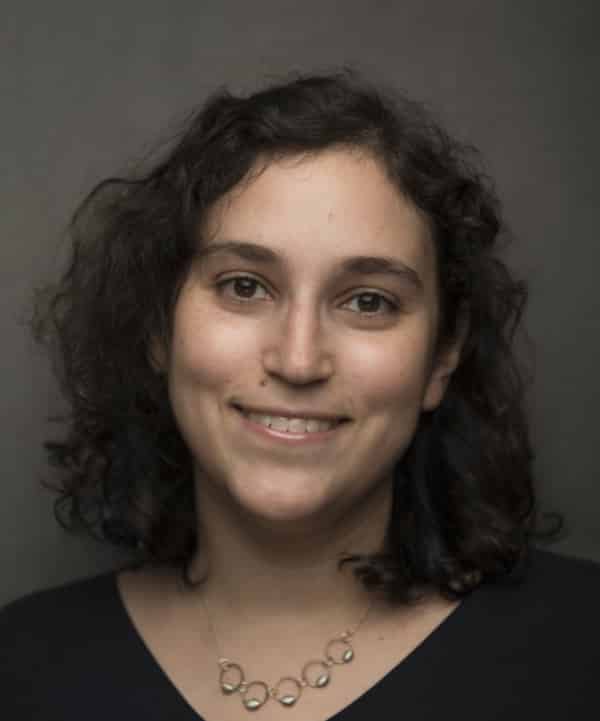Pandata is a four-year-old, quickly growing data science consulting firm in Ohio founded by Cal Al-Dhubaib, the first data science graduate from Case Western Reserve University. As Pandata began expanding its data science team, it needed a solution that would help the small founding team confidently and efficiently scale the process of hiring data scientists. With senior managers focused on winning and managing projects, the firm needed an efficient way to assess data science skills. Here’s Pandata’s story about using the QuantHub platform to achieve that.
A Small Company Scaling Steadily in the Data Science Space
Hannah Arnson is the lead Data Scientist at Pandata.
Pandata started out primarily focused on sales and marketing projects. The company’s lead Data Scientist Hannah Arnson describes these projects saying,
“Everywhere there’s data. Sales and marketing just happen to have a lot of data.”
Sales and marketing projects are still a significant part of Pandata’s portfolio. However, by leveraging this “front door” to clients with these types of data needs, Pandata has been able to demonstrate the value of data science in other areas. The firm has subsequently expanded into a wide variety of industries and project areas such as cybersecurity, higher education, arts and entertainment, and healthcare operations.
Pandata typically works with upper mid-market and enterprise-level clients, both locally and nationally. As such, the company is ramping up its hiring of analytical talent to meet growing client needs.
The Need for Data Science Skills Assessments
Arnson is quick to point out that Pandata’s growth has been fueled by a pressing market need.
“There’s a real need in Ohio and other Midwest states. There are many companies that need data science but don’t know where or how to get started.”
Arnson points out, however, that in Cleveland the data science talent pool is small. Enter Pandata to fill the skills gap.
But with a small team and many opportunities for data science projects on the horizon, management has found it a time-consuming challenge to create various types of technical skill questions and problems that could effectively vet data science candidates. Arnson emphasizes that the team has so much else going on they need a quick solution for technical skill assessments.
“We were looking for a way to technically vet candidates that didn’t require a huge effort like coming up with statistics and other multiple-choice questions on our part. When we found QuantHub, it addressed a really useful part of the hiring process to have that automated vetting so that we don’t have to do that much.”
Pandata’s Use Case for QuantHub
Pandata started out using QuantHub to vet and hire applicants for Data Scientist roles. Over time the firm has found, like many have, that retaining Data Scientists can be difficult, particularly if they lack some skills or if they are not a cultural fit. Retention is very important for Pandata because its client projects and relationships tend to have longer-term horizons.
So, the team is moving towards a strategy of hiring and training Data Analysts internally to become Data Scientists. Arnson explains the reasoning behind this hiring strategy change,
“We found that this is a really effective way of getting talent that we work well with, which fits in with our core values, and which sticks around. Given the talent pool in Cleveland, it opens up the possibilities.”
Thus, Pandata has recently begun using QuantHub to assess the skills of Data Analyst candidates with a minimum of 3 years of experience.
That said, Pandata recognizes that a certain amount of data talent turnover is acceptable, as Arnson explains,
“We’re devoted to developing the Cleveland data science pool so that the data talent will spread.”
Advantages of Using QuantHub in the Hiring Process
With projects picking up and customer relationships expanding, Pandata’s goal is to double staff over the coming year. That’s a great situation to be in, but it makes hiring top talent a pressing issue.
For one of the recent Data Analyst positions that Pandata was trying to fill management received around 100 applicants. With the lead Data Scientists busy on projects, they used QuantHub to assess several qualified candidates and narrow down the pool.
What kind of skills is Pandata specifically looking for? Programming languages are important as well as statistics. Of these skill requirements, Arnson says,
“They need a minimum of being able to work with R and Python…We use QuantHub assessments to make sure candidates have a basic set of skills and then we give them a data science challenge at the same time.”
Another key benefit that QuantHub delivers is time saved. Explaining how much time it takes to recruit, evaluate, and make a data science hire Arnson understandably exclaims,
“It takes too much time! There are 3 of us (Managing Partner, COO and herself) involved in the hiring process and it is spread out over a few days. It’s a good ½ day of interview work for each of us, plus the time to read resumes and applications, do initial telephone screens and assess for a cultural fit, which is a really big factor for a small company like us.”
Lastly, Arnson appreciates that QuantHub assessments give the management team an objective and fair comparison of each job candidate.
“It’s helpful to have a concrete and objective metric across all the candidates.”
As an example, Pandata recently assessed a candidate that scored in the middle of the pack on the QuantHub skill test, but did an impressive job in their interview presentation, explaining complex concepts in a way that a business professional could understand.
With QuantHub the team has the information to objectively assess the tradeoff between technical scores and other key skills.

